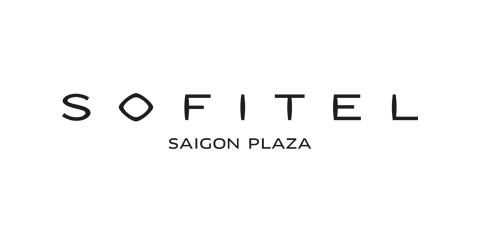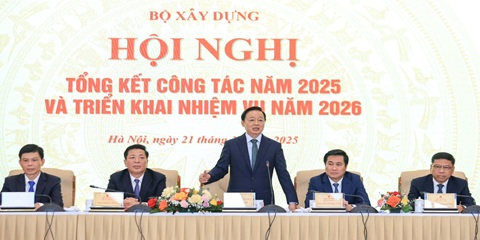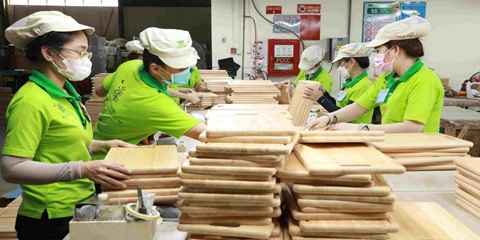Want to be in the loop?
subscribe to
our notification
Business News
CREATING BREAKOUT MOMENTUM FOR INDUSTRIAL PROPERTY
Industrial property is the most attractive segment in 2019, said Mr. Nguyen Tran Nam, Chairman of the Vietnam Real Estate Association (VNREA).
Booming opportunity
According to many experts, the industrial property market (including industrial land, ready-built factory, warehouse and logistics) in Vietnam is seeing huge opportunities for strong and explosive development and exerting a strong pull on foreign investors seeking to shift international investment flows amidst U.S.- China trade war.
Vietnam’s new policies on industrial property such as industrial restructuring strategy, new legal frameworks for management of industrial zones and economic zones, have also opened many opportunities for industrial zone development across the country, thus facilitating businesses and investors to invest in this market.
Besides, Vietnam has tax incentives such as reducing corporate income tax, import tax and personal income tax and reduce costs of land rents, factories and technical materials to court foreign investors.
According to Nam, the strong market growth results from Vietnam’s direction on building an export-driven economy. In addition, the performance is also boosted by the establishment of key industrial and economic zones, active entry into free trade agreements (FTAs), robust economic growth in recent years and the availability of low-cost young human resources.
This is clearly reflected with the formation of key industrial and economic zones across the country. At the same time, its entry into 16 FTAs also helps improve the business environment for domestic and foreign enterprises.
A strong growth of foreign direct investment and a shift in value chains has opened up a bright future for the industrial property market, especially as FDI flows into Vietnam are still increasing.
By 2020, Vietnam will have about 500 industrial parks covering 500,000 ha. Therefore, the opportunity to own land for penetration and development in the industrial property market is enormous for both existing investors and potential investors.
Consistent and public real estate planning needed
The development of industrial properties in Vietnam has, however, posed shortcomings. Mr. Nguyen Dinh Cung, Chairman of the Central Institute for Economic Management (CIEM), said existing setbacks include asynchronous infrastructure for different types of transportation. There is a serious imbalance between road transport and other types of transport such as railways and waterways. Road freight accounts for 77% of the country's total cargo transport. Logistics costs account for nearly 21% of total GDP, higher than most countries in the region.
Key industries are still labor-intensive. Given low-level technical infrastructure and factories, commodity production must shift to higher steps: Green, labor-efficient and high-tech industries will be new tenants of industrial property. This means that industrial property must meet higher technical standards.
Mr. Tran Quoc Trung, Deputy Director of the Economic Zones Management Department under the Ministry of Planning and Investment, said, to tackle above problems, Vietnam needs to study, build and diversify industrial zone development models such as ecological industrial parks, cross-industry parks, supporting industry parks and specialized industrial parks for certain industries and domains. At the same time, it needs to perfect legal provisions on industrial, urban and service zone models for synchronous technical and social infrastructure development.
Mr. Nguyen Tran Nam said, Vietnam needs to change its thinking and planning of industrial land in national, regional and local master plans. In addition, it needs to focus on planning clean and eco-friendly industrial zones and attract advanced technologies with sustainable, long-term development objectives. Planning should be made consistent and public for investors to research, seize opportunities and participate in early investment.
In particular, it is necessary to make property market information transparent, featured by long-term, stable policies to minimize risks to assure both domestic and foreign investors of the market.
At the same time, Vietnam needs to enhance competitiveness for cross-border transaction costs and study and adopt suitable conducts in the Industry 4.0 era to develop the industrial property market in Vietnam.
Source: VCCI
Related News

A STELLAR CHRISTMAS AT SOFITEL SAIGON PLAZA
Experience the magic of year-end celebrations in five-star luxury, where Parisian elegance meets Saigon’s festive vibrancy. Discover your Stellar Christmas moments: https://sofitel-saigon-plaza.com/festive-offer-2025

CONSTRUCTION SECTOR POSTS OVER 9% GROWTH IN 2025
Industries under the ministry’s management accounted for an estimated 17.23% of national gross domestic product (GDP), up about 0.17 percentage point from 2024. They contributed around 1.96 percentage points to overall GDP growth, reported the Vietnam News Agency. The contribution helped push Vietnam’s economic growth to above 8% in 2025 and supports the Government’s aim of pursuing double-digit growth in the coming years.

VIETNAM PUTS PUBLIC INVESTMENT DISBURSEMENTS AT VND603.6 TRILLION
Vietnam’s public investment disbursements had amounted to VND603.6 trillion in the year to December 18, equivalent to 66.1% of the plan assigned by the prime minister. According to the Ministry of Finance, actual disbursements by December 11 had totaled VND577.7 trillion, or 63.3% of the prime minister-approved plan of VND913.2 trillion, the Vietnam News Agency reported.

SHINE INTO 2026 AT HOIANA RESORT & GOLF!
This New Year’s Eve, celebrate where the sea meets the sky. Vibrant performances, festive dining, DJ beats, live bands and dazzling fireworks come together for one unforgettable night. From beachfront countdown moments to curated New Year’s Eve dinners across Hoiana, every detail is designed to welcome 2026 in style.

VIETNAM’S TRADE SET TO SURPASS US$900 BILLION FOR FIRST TIME
Vietnam’s total import-export turnover is expected to reach about US$920 billion by the end of the year, marking the first time the country’s trade value has exceeded the US$900-billion mark. As of December 15, Vietnam’s total trade turnover stood at US$883.7 billion, according to the Agency of Foreign Trade under the Ministry of Industry and Trade.

GLOBAL SOURCING FAIR VIETNAM 2026 – THE TRULY GLOBAL B2B SOURCING SHOW IN VIETNAM TO EXPAND & DIVERSIFY YOUR EXPORT MARKETS WORLDWIDE
The 4th edition of Global Sourcing Fair Vietnam returns in 2026 with an impressive scale, featuring 700 booths showcasing Fashion & Accessories, Home & Gifts, and the newly introduced Printing & Packaging Products from 500+ verified suppliers across Vietnam and Asia – including Mainland China, Taiwan, Hong Kong SAR, South Korea, India, Bangladesh, ASEAN, and more.
























